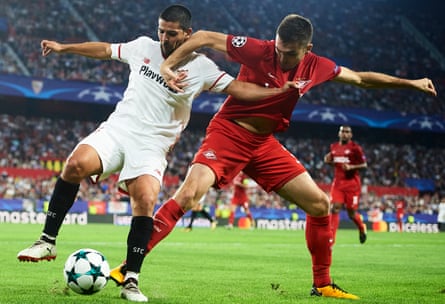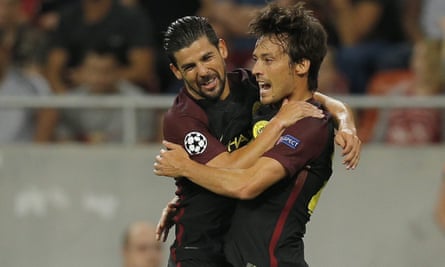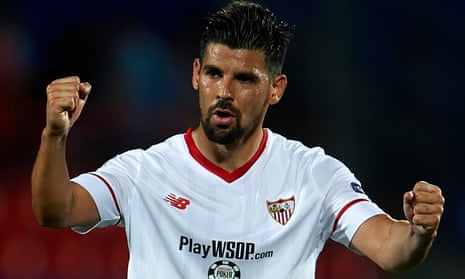Nolito says he was “joking”, which he often is, as another cheeky grin sweeps across his face and he starts laughing again. “Bloody hell,” he says, which is something he says a lot – or its slightly ruder Spanish equivalent anyway. And then he continues: “But it was for real, eh! I had to give her vitamin D, the poor thing. We’d go outside but the sun just never came out. Even I ended up pale …” A quick glance up and he adds, giggling: “Just like you!” And just like his daughter Lola, aged nine, and one‑year‑old twins, Lara and Alegría.
Towards the end of his first season in England, by which time he knew it would be his last, the former Manchester City player, now back in Spain with Liverpool’s Champions League opponents Sevilla, said his daughter had changed colour. “She looks like she’s been living in a cave,” he said then. He says now: “It got misinterpreted. It was just a joke, a throwaway line. And it was true: there was no sun and the paediatrician said: ‘Try this …’
“Maybe there are some people with no sense of humour but no City fan has ever heard me talking down Manchester. It has positive things but it is like that: at 5pm it’s dark and it’s cold, the philosophy of life is different. Why do lots of English come to Marbella? To Gibraltar? Even to my home town, Sanlúcar? They come, drink wine and eat jamón in their socks. They eat de puta madre, they live de puta madre, feel de puta madre.”
Roughly, de puta madre means effing fantastic, which is another thing he says a lot.
It is November in Seville, almost 2,000km south of Manchester, less than 100km from home, and Nolito is in a T-shirt. He says his daughter has got her colour back. Slowly he is getting his football back as well, or trying to. He talks about “feeling like a footballer again” but it is not easy when, through absence and injury, you have gone virtually seven months without playing. And when you are from Sanlúcar de Barrameda, where there are 1,500 hours of sunshine a year more than in Manchester, and a third as many rainy days, where the average temperature never drops to single figures, the north‑west can be quite a leap.
“That’s the principal problem: almost all footballers are people,” Nolito says. Almost all? There are some that aren’t? “Well,” he grins, “there’s a bit of everything on God’s earth. But, yeah, we’re people: every player has his story, things going on in his life, which is why I stopped reading things, listening. Comments hurt you and hurt your family. People can say: ‘That’s part of the job.’ Yeah, right, but being insulted isn’t part of the job. One day, I’ll retire and it’s the person who’s left.” For Nolito, the problem was that mostly there were not things going on – on or off the pitch.
“We lived close to [David] Silva and to Edu, a physio friend who worked at City. We’d have lunch together, dinner at home, go down and have a coffee, but it didn’t quite work. If it gets dark at 5pm then at six it’s like it’s 10 o’clock and you even start to get tired. You think: ‘Bloody hell, it’s only six!’” At times, his brother came to visit, but that didn’t work either. “He didn’t hang around,” Nolito says, swiftly. “Three, four days and then …” He dusts off his hands. “‘Flight to Gibraltar!’ ‘Flight to Gibraltar!’ I was like: ‘Stick around. I’ll pay you, hahaha.’ Nah, it’s a joke, but even if I had offered it he wouldn’t have lasted 10 days. He was the same [when I was] in Vigo. He was used to life in Sanlúcar. He came to England three or four days, saw a nice game, and he was off, with the shirt.”
Unused, normally. Because while the lifestyle was different, it was the football that really decided Nolito’s destiny. “My daughter spoke English, so did my wife; I was the only one that didn’t, and I took classes with Jesús [Navas],” he says. “They adapted well; it was just a shame I didn’t play in the last few months.”
By mid-October Nolito had played nine times, scoring five and all seemed well. A regular starter, from his arrival to the end of the year he played 21 games; from the turn of the year he played nine, mostly as a sub. The League Cup tie against Huddersfield Town in February was the final time he started a match.
So, what happened? “You’d really have to ask the míster,” he says. “I arrived there full of hope, the best place in the world to play football. He called me, convinced me and in the beginning things worked well.

“The football surprised me at first: seeing a striker getting pulled all over the place by a big defender and the referee not giving anything. You see some hits …” Nolito makes a gesture that says: wallop! “Sometimes you know it’s coming and you can jump out the way but, if they catch you: phwwwww! Players dive and they’re strict on that but someone goes right through you and [there’s] nothing. But in the end, it’s still football. If you’re not happy because you haven’t adapted, that can transmit to the pitch but at the start I was happy and playing well.
“And then, suddenly, he clipped my wings a bit. It’s true that City are a very good team with very good players but I think I didn’t deserve those last four months. I deserved to play more. That’s my opinion but these things happen. When you go four or five games without playing – in the stands, on the bench, 20 minutes, no minutes – it’s a radical change. You think: ‘Bloody hell, what happened?’”
Did he ask? “No.” Why not? “Because. No words are needed. There’s not much you can ask that you don’t already know. If in 10 games you play three, you get the message.”
As Nolito talks and laughs and jokes, an idea forms. Has that personality counted against him? Is he seen as not serious enough? And is Pep Guardiola too serious? “Well, yes,” he says with a grin, “but that’s like lots of coaches. And, look, it’s not that I don’t take it seriously, [even if] I do take it differently: there are people who, if they don’t win, don’t eat. You have to eat, you’ve got to get up the next day. It saddens me that they suffer more than they need to because in the end it is a game.
“I am what I am: I love to attack and what I like the least is defending, haha! I [also] like a joke. But that doesn’t mean anything. When you have to pull on your work overalls, you do. No coach could ever say I haven’t worked hard, and never will. You can train happy or you can train sad or you can train bitter,” Nolito says, pulling a face. “You only live once.
Football’s there to be enjoyed. It can’t be that one day you are useless if you don’t score and the next day you’re a superstar if you do. I try to enjoy myself every time I play.”
There were few opportunities for enjoyment, Nolito watching the second half of his only season from the stands, his mind made up. By the time he watched City knocked out of the Champions League by Monaco – “the manager was destroyed and so were the players; maybe we didn’t have the intensity and desire we should have had that night, but they were flying” – the decision had long been taken. “I’ll always be grateful to Pep: he gave me my debut for Barcelona and signed me for City. I don’t know if he then changed his mind, if he didn’t think the way I thought, but I never had a problem with him and don’t now. I wish him the best, and the team.”
Now, watching from afar, he sees continuity in City’s model. But he sees change, too. Nolito learned and thinks Guardiola has learned, too. “You do things with him on the training ground you’ve never done and later think: ‘Bloody hell, he was right!’ Coaches sometimes just say: ‘That’s the way it is,’ and don’t explain. He’s the coach, right? But Pep would say: ‘This is how it is, because of this, this, this and this. And if you do it, then this is what’s going to happen.’ And often that’s exactly how it works. He’s a wizard, one of the best in the world easily.
“He was at Barcelona and they played effing fantastically. He’s been at Bayern. Then he went to England and perhaps the first year didn’t turn out so well. It’s not easy arriving there where it’s more physical, more intense, where they hit you harder. You give away one corner and they score. [For the players] it’s difficult to adapt to a new philosophy. If you’re 30, you think: ‘Bloody hell, I’ve never done that.’ It takes time but, bit by bit, they changed and now they’re flying. The míster is very stubborn, very headstrong and they have to do what he wants. [But] I think he’s adapted to English football, too. I’m not in his head but maybe he’s realised you have to be stronger, quicker. You see that in signings like [Kyle] Walker and [Benjamin] Mendy.”
Yet it is Kevin De Bruyne who has most stood out for many – if not for Nolito. “He’s a magnificent player: he scores goals, works hard, has everything. He’s young but is one of the best in the league. If you make me choose, though, I’m going for Silva,” he says.

“Silva is a magician and he’s underrated,” Nolito says. “He doesn’t get the praise he deserves. People don’t talk about him, others get raved about more. If he was English maybe it would be different. But I think Silva’s the best in the Premier League. He doesn’t score the most goals but what he does every week no other player does. There are players who are powerful, quick, strong, but they don’t do what Silva does. They can’t move as if the ball’s tied to their boot. They don’t have that calmness, that pass.”
Maybe Silva’s low profile goes against him; the fact that he doesn’t appear to be a leader? “He’s an effing great guy, who looks after his friends,” Nolito says. “And a great team-mate too. He keeps himself to himself. Maybe he doesn’t want to be leader but he has all the qualities. And he’s the best in the Premier League without receiving the recognition – without doubt.” Do City lack leaders? “No,” Nolito says, laughing. “The leader is the míster. The leader is Pep Guardiola. He is in charge. And that’s enough leadership …” He laughs again, another true word said in jest?
It would be tempting to watch City succeed now, to see them top, to miss Silva and question the decision to go. After all, they are, in Nolito’s words, like “motorbikes” right now. But he insists that is not his case nor has he given up on a place in Spain’s World Cup squad or the Champions League final. He says he would pay to be there and face City, joking as he starts the bidding at “50,000 euros ... 100,000 euros”.
“It was good, the experience was good but the decision to leave was made a long time back and I don’t regret coming here. I’m grateful to have had the opportunity to play in the Premier League at a great club but I wasn’t playing and I wanted to play. Now I feel like another player at Sevilla. I’m close to home and I want to get back to the level I had in Vigo, helping the team and enjoying myself. There’s always hope [for Russia]. It’s difficult but there are seven to go; Euro 2016 was difficult too and look. I’ll keep going, like a steam hammer. I feel like a kid again. I want to enjoy this for as long as I can, then retire happy.
“I won’t go on forever. And when I’m finished,” he says, dusting off his hands, “let the young ones come and play instead. I’ll go back to my village, go fishing with my brother, maybe train the kids, play for the veterans, a bit tubby.”
Just not yet. “Life goes on: the sun comes out every day,” he says, grinning as he gets up to leave Sevilla’s training ground. “At least in Spain it does.”

Comments (…)
Sign in or create your Guardian account to join the discussion